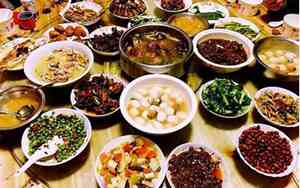
年夜饭在中国文化中具有深厚的意义,它是农历新年的重头戏,象征着团聚、和谐以及来年的好运。吃年夜饭时,家庭成员围坐一堂,共享美食,寓意着团圆美满,增进亲情。每道菜肴都有其特定的象征意义,如鱼表示年年有余,寓意着财富和富饶;饺子则象征着财富和好运,因为其形状似金元宝;年糕取其“年年高升”的美好祝愿,意味着步步高升。
In Chinese culture, the New Year's Eve feast carries profound significance. It is a time for family reunion, harmony, and good fortune for the upcoming year. When eating together during this meal, it signifies unity, warmth, and the strengthening of familial bonds. Each dish holds symbolic meanings, such as fish (yu), which represents abundance and prosperity; dumplings symbolize wealth and good luck due to their appearance resembling gold ingots; and sticky rice cake (nian gao) represents continuous growth and improvement, symbolizing upward mobility.
In English, the New Year's Eve dinner can be described as a "ritual of togetherness, where shared meals carry the hope for a prosperous and harmonious new year, through symbolic dishes that convey wishes for abundance, prosperity, and upward progress."
年夜饭在中国文化中承载了丰富的文化内涵,它不仅仅是一顿普通的晚餐,而是中国传统节日习俗、家庭价值观和民俗信仰的体现。以下是年夜饭文化内涵的一些方面:
1. 团圆与亲情:年夜饭是家人团聚的时刻,无论人们身处何方,都会尽可能回家与家人共度这一晚,象征着家庭和睦与亲情的深厚。
2. 祥瑞与祈福:菜肴的选择和吃法往往有吉祥如意的寓意,比如鱼取其发音与“余”相似,寓意年年有余;饺子象征财富,因为其形状像古代的金银货币。
3. 传承与习俗:吃年夜饭时,长辈会讲述家族历史和传统故事,使年轻一代了解和传承中国的文化传统。
4. 寓意未来:吃年夜饭时的各种活动,如守岁、放鞭炮,都有送走旧岁的象征,而新菜品则寓意着新一年的希望和期待。
5. 烹饪艺术:年夜饭往往是一场视觉与味觉的盛宴,体现了中国烹饪的艺术性和家庭的精心准备。
无论是家家户户的团聚,还是食物的象征意义,年夜饭都丰富了中国人的节日体验,体现了中国文化中对家庭、和谐和未来的重视。
Title: The Significance of the New Year's Eve Feast in Chinese Culture
As a cornerstone of Chinese traditional festivals, the New Year's Eve dinner (Chunyu Fan) holds immense cultural significance. It is not merely a meal; it's a celebration of family, traditions, and the hope for a prosperous new year.
Firstly, it embodies the essence of unity and familial love. The dinner is a time when scattered families gather under one roof, symbolizing the importance of togetherness and the strong bonds between family members. It's an occasion where love, care, and tradition are passed down from the older generation to the younger ones.
In terms of symbolism, the dishes are carefully chosen for their auspicious meanings. For instance, fish (yú) is often served because its pronunciation resembles "yu" which symbolizes abundance and prosperity. Dumplings (jiaozi), being round and resembling ancient coins, represent wealth and financial stability.
Moreover, the New Year's Eve dinner also serves as a way to pass on cultural heritage. Elders might share stories and teachings from the past, instilling values and customs in the younger generation, ensuring the preservation of Chinese culture.
The activity surrounding the dinner, such as staying up late (chunyue) to welcome the New Year, and the custom of setting off fireworks, represents the letting go of the old and the anticipation of the new. Each dish, eaten with mindfulness, holds a promise of a promising future.
The culinary aspect of the New Year's Eve feast is also significant, showcasing the art of Chinese cuisine and the dedication each family member puts into preparing a feast that both satisfies the palate and uplifts the spirit.
In conclusion, the New Year's Eve dinner in China is a profound cultural event that encapsulates family values, symbolic meanings, and the hope for a bright and prosperous year. It's an integral part of Chinese cultural identity that brings people together and fosters a sense of unity, love, and continuity.
吃年夜饭的寓意和来历在中国有着悠久的历史,深深根植于中国传统文化之中。以下是年夜饭的一些关键寓意和起源:
1. 团圆与和谐:年夜饭是春节庆祝活动的高潮,家庭成员们从各地回到家中,围坐在一起享用晚餐,象征着家庭的团聚和和谐,也寓意着家庭的和睦和团圈氛围。
2. 祥瑞与祝愿:菜肴往往选择寓意吉祥的,如鱼取其发音近似“余”,象征年年有余,鱼鳞则寓意年年富饶。饺子则因形似古代金银货币,象征财富和好运。
3. 长辈教育:在吃年夜饭时,长辈会讲述传统的故事和历史,传授一些生活智慧,使孩子们了解中国传统文化和礼仪。
4. 送旧迎新:守岁,即在除夕之夜熬夜等待新年的到来,寓意着辞旧迎新,辞去旧岁中的一切不顺,迎接新年的福气。
5. 烹饪艺术:年夜饭也是一次展示烹饪艺术的盛宴,每道菜品都经过精心准备,体现出家庭的热爱和对生活的热情。
年夜饭的起源可以追溯到古代,当时人们在冬至后举行祭祀活动,庆祝活过严冬。随着时间的推移,这个习俗逐渐成为庆祝春节的重要部分,承载着中华民族对家庭、和谐与繁荣的深深期盼。通过这一餐饭,人们在欢声笑语中寄托了对新一年美好生活的向往。
The significance and symbolism of the New Year's Eve feast in China have a rich cultural context, which can be translated into English as follows:
1. Gathering and Unity: The New Year's Eve dinner represents family togetherness and harmony, symbolizing the importance of unity and the bond between loved ones. It is a time when scattered family members reunite to share a meal.
2. Abundance and Fortune: Common dishes carry symbolic meanings, such as fish (yú), which due to its pronunciation, is associated with abundance (yu prosperity). Dumplings (jiaozi) are believed to bring wealth because of their resemblance to ancient coins.
3. Cultural传承: The meal is not just a celebration; it's an opportunity for elders to pass down traditions and values, teaching younger generations about Chinese heritage.
4. New Beginnings: Staying up late to welcome the New Year (chunyue) represents a transition from the old year to the new one, symbolizing letting go of the past and embracing the future.
5. Culinary art and tradition: The preparation of the New Year's Eve feast reflects a love for culinary art and the importance of family effort in creating a memorable dining experience.
In summary, the New Year's Eve dinner is a profound cultural event in which family, tradition, and auspicious symbolism are interwoven, signifying unity, good fortune, and the start of a new chapter.
copyright © 2022 一生命运网 版权所有 辽ICP备2022007116号-4
法律声明:本站文章来自网友投稿,不代表本站观点,版权归原创者所有,如果侵犯了你的权益,请通知我们,我们会及时删除侵权内容!
